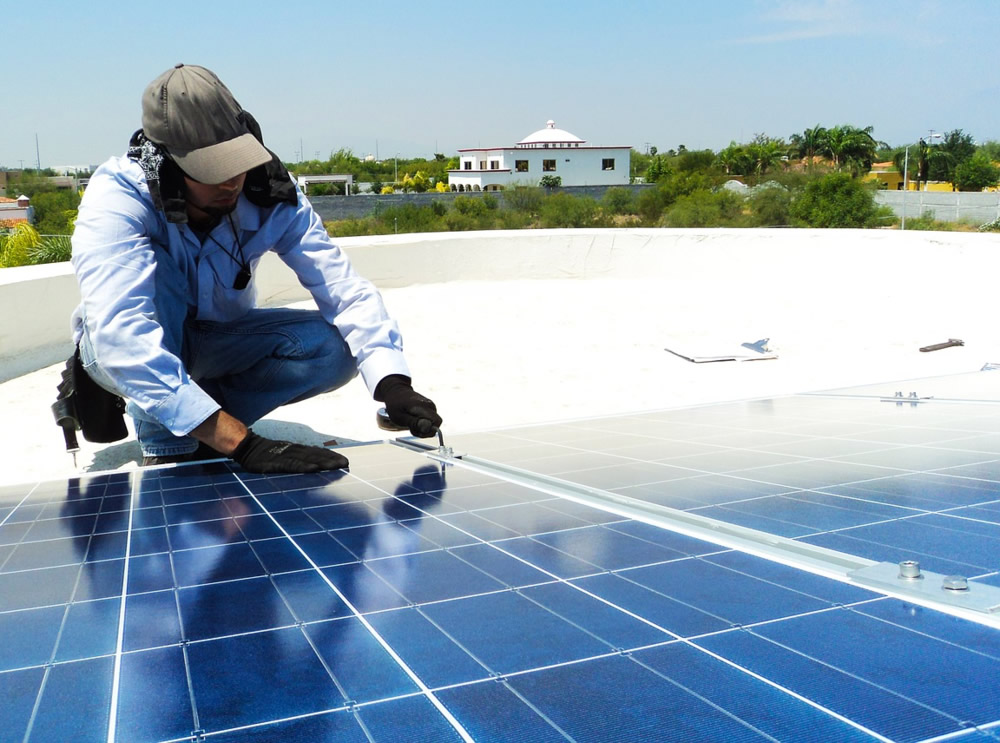
By Lindsay Street, Statehouse correspondent | A compromise is in the works in a Senate Judiciary subcommittee where a major House solar bill is hung up on a single issue.
“We want the opportunity to grow solar in South Carolina but we want to put the very best processes to do that,” Senate Judiciary subcommittee Chair Sen. Mike Gambrell, R-Anderson, said Wednesday.
The bill seeks to make solar power more accessible for those looking to install rooftop systems and to help solar-generating plants become more competitive.
At issue in the bill, called the “South Carolina Energy Freedom Act,” is whether the state should mandate contract lengths between utilities and solar providers. Opponents of the current language called it “bad public policy” that shields private companies from market fluctuations.
Solar proponents appear willing to work toward a compromise in the subcommittee, but one group called fears over the contract length a “scare tactic.”
“There’s a general consensus of support for the bill,” Orangeburg Democratic Sen. Brad Hutto told Statehouse Report. “We need to have legislation in this area to promote solar and interconnectivity, (but) it’s a complicated subject matter and there are a lot of stakeholders.”
One of three big legislative priorities
Energy policy is one of three big issues the Senate is looking to resolve before summer recess, Senate Majority Leader Shane Massey, R-Edgefield, said. The other two large items are education reform and the state’s annual budget. Education reform could come to the Senate floor in the next two weeks, and the budget will likely be taken up before Easter, April 21, Massey said. That leaves little time to get the proposed legislation through the Senate prior to the budget, but there would be time at the end of session to get the bill voted on.
“I’m hopeful that we will be able to get a vote on some language at the next meeting,” Massey said.
Hutto and Massey felt confident a compromise could be reached as early as the next subcommittee meeting, which is slated for after adjournment of the Senate March 28 in room 308 of the Gressette building.
Detail about the bill
Most of South Carolina’s solar generation comes from rooftop solar, but there has been a 20-fold increase in 2017 in utility-scale solar generation, according to a federal report. The House bill, which received unanimous support before heading to the Senate, deals with both sectors.

The bill could allow for expansion of solar-derived energy in the state, a burgeoning industry with thousands of jobs connected to it. Conservation Voters of South Carolina (CVSC) Executive Director John Tynan said the bill could “drive millions if not billions of private investment” and would create more competition in the energy sector.
The bill establishes rights for electrical utility customers, provides for judicial review of the violation of electrical utility customer’s rights, and establishes procedures for periodic hearings to review and approve electrical utilities’ contracts.
Most importantly to many rooftop solar advocates, the bill removes a solar leasing cap, which currently mandates utilities only have to reimburse customers fully for electricity generation until the state’s solar rooftop units supply more than 2 percent of its average peak demand and the reimbursements would only be guaranteed through 2025. In the bill, those who install rooftop solar before the 2 percent of average peak demand and within the next two years would be guaranteed set rates, Tynan said. He added this will give rooftop solar residences “certainty” of electricity generation reimbursement.
According to a Feb. 20 report from the state Revenue and Fiscal Affairs Office, the bill would increase costs at the Office of Regulatory Staff by $356,800 with the hiring of four full-time employees and additional expenses. The report said there would be an “undetermined amount” increased for the Public Service Commission, which reviews utility contracts in the state.
While solar advocates like Tynan worry the Senate could still prove tough for the bill to pass — a similar bill got tied up in debate on the floor last year — panel members signaled willingness to move forward this week.
‘Bad public policy’ vs. ‘scare tactic’
Much of the debate in the subcommittee comes down to the mandated 10-year contract between S.C. investor-owned utilities and solar-generating companies. According to the bill, the mandated contract length is only in place until solar generation reaches 20 percent of average peak demand. The idea behind the contract length is to help solar-generating power producers compete and secure financing.

The contract-length mandate killed the bill in the Senate last year with the help of York Republican Sen. Wes Climer. He is serving on the subcommittee reviewing the bill.
Climer still opposes any legislatively-mandated contract length in the bill.
“It is bad public policy to enshrine in statute that would take a future act of the General Assembly the contract duration between two private parties,” Climer said. He added he was willing to soften the language that guided the state’s Public Service Commission on the contracts, however. “(But) if the millionaire solar developers insist on having ratepayers guarantee their profits regardless of what happens in the market, there will not be a bill this year.”
Tynan’s group called the opposition to the set contract length a “scare tactic.” The group contends that short contract lengths can be used to stifle solar generation development as independent producers seeks bank financing to meet contract obligations. According to CVSC, which cited a state Office of Regulatory Staff report, making contract lengths shorter will not help improve rates for ratepayers.
Climer said a compromise that creates a more market-based solution and protects ratepayers would “sail through the Senate,” but once a compromise is reached, there may be a few more obstacles.
“(The mandated contract length) is a big issue but it’s not my only issue,” Climer said. He noted that he also didn’t like that rooftop solar residences are guaranteed a one-to-one electricity generation compensation. He said that their reimbursement of their electricity generation does not take into account paying for infrastructure and its maintenance, putting that cost on other ratepayers.
Climer said his opposition is tied to his desire to protect ratepayers, not shield solar generation companies from market fluctuations or give rooftop solar customers an edge over other ratepayers.
- Have a comment? Send to: feedback@statehousereport.com



I am a South Carolina newbie from Massachusetts. My sister and close friends in Massachusetts are using solar for their electricity…but here in sunny SC I see very few participants. Hoping to see more in my lifetime. I do not oppose the use of fossil fuels even though I wonder about taking so much out of the Earth…I do love science and progress.
As someone who installed (bought, not leased) solar last year, I am alarmed that the net metering will be extended only to June 2021. I will in no way have recouped my investment by then, and though I did it to help the planet (I believe climate change is an existential threat to all of us – but even more so to those of us who live in the Lowcountry), I don’t want to go broke doing so.
I will be watching how the PSC sets rates from June 2021 and beyond. As it is, I am appalled that our November bill “pays” us for any excess carry over at that point at 3.256 cents rather than the 11.87 or 13+ cents I am charged when I use Dominion energy.